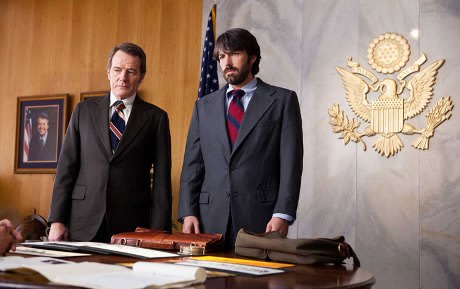History looms large over Ben Affleck's excellent early '80s Iran hostage crisis thriller, Argo. It suffuses the film itself, a remarkable recreation of the time, feel and period detail of the events of 1979 and 1980, when six Americans escaped from a hostage taking inside the American Embassy and hid for months in the homes of various Canadian diplomats. Critics, historians and notably Canadians have taken issue with the interpretation put forth by Affleck and screenwriter Chris Terrio, which portrays the heroism of C.I.A. agent Tony Mendez and marginalizes the Canadian involvement as, to a lesser or greater extent, a front to hide American espionage from the international community. And following its Academy Award win for Best Picture — a less controversial consensus choice against better, but more polarizing films — history will once again assess Affleck's legacy: as a director snubbed by the Academy; as a craftsman creating a taut, entertaining film; and as an interpreter of the "true events" portrayed here. On a fundamental entertainment level, Argo is a very good movie; it apes the vibe of 1976 Watergate investigation All the President's Men, recreating the period as well as David Fincher did in Zodiac. But unlike those two films, Argo draws strength from the propulsive forward momentum of its narrative rather than the cumulative effect of its accrued details. After the tense and intimate documentary feel of Iran's internal 1979 revolution, Argo switches to a near-comic tone of "getting the gang together" — in this case, a fake Hollywood production company to provide a cover story to smuggle out six Americans, under the guise of being location scouts for a Canadian sci-fi movie. And all the Hollywood stuff is very entertaining — some light mocking of the preening and posturing that exist at the core of Los Angeles plays beautifully into the ruse the C.I.A. is attempting to pull off. But what Argo doesn't do is make us care about anything other than the risk of the caper. As real-life agent Tony Mendez, Affleck is a blank slate, moving pieces around the board game of international intrigue. Meanwhile, the six Americans trapped in Tehran wile away time at the home of Canadian diplomat Ken Taylor (another factual fudge: not all six stayed in one house), but the film never invests in them as characters — they are merely the cargo in the film's heist caper. The Blu-Ray/DVD package is excellent, with several short documentaries, including interviews with Mendez and other houseguests, the absurdity of the C.I.A. teaming up with Hollywood producers and especially the commentary from Affleck and Terrio, who won a screenplay Oscar for the work. None of the extras actually acknowledge the factual fudging that's been revealed since the film's release, but the inclusion of 1981 Canadian TV documentary Escape From Iran: The Inside Story at least showcases Canadian involvement. (Incidentally, the whole story was also told as a fictional TV movie, Escape From Iran: The Canadian Caper, starring Gordon Pinsent.) I haven't seen it, but I'd wager it's truer to history than Argo, and likely a lot less entertaining.
(Warner)Argo [Blu-Ray]
Ben Affleck

BY James KeastPublished Mar 1, 2013